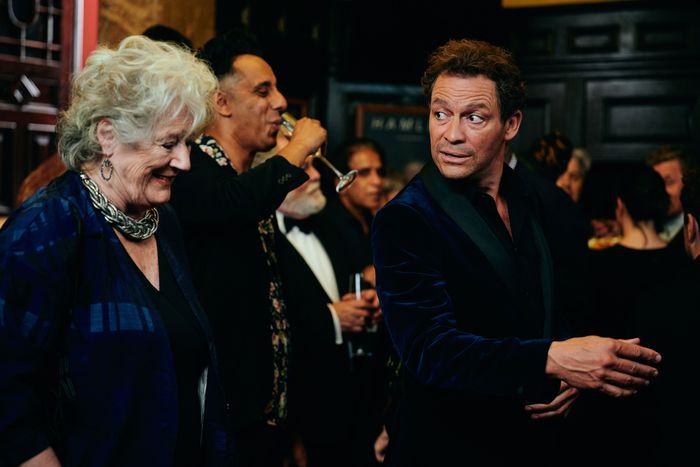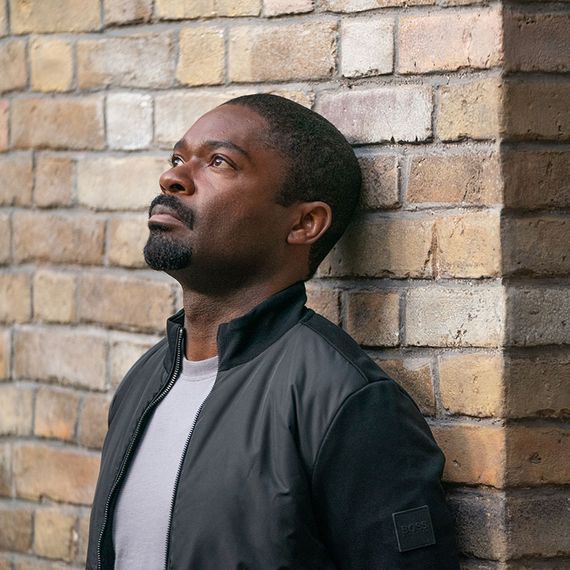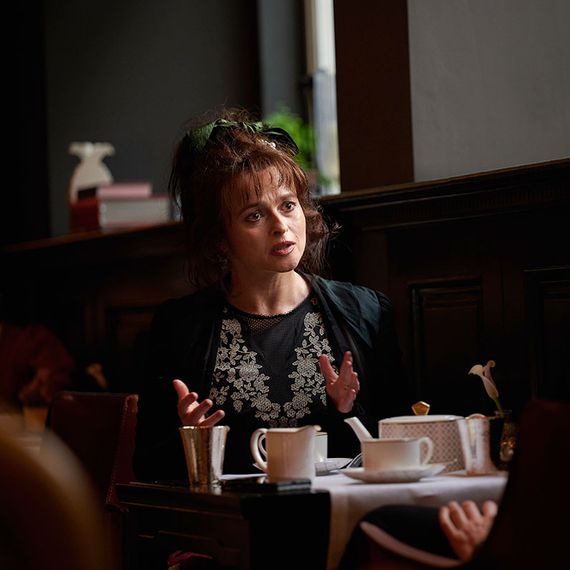
Imagine a boutique talent agency in a European capital, led by a doting paterfamilias surrounded by a group of other agents: a hard-charging lesbian, a bumbling straight guy, a cheating husband with a preference for nice suits, and a grande dame who loves her little dog. If they’re all speaking French, that’s the premise of Call My Agent! (or, si vous parlez français, Dix Pour Cent!), Netflix’s global hit series documenting the absurdity of the Parisian entertainment industry with gorgeous coats, Gallic insults, and cameos from the likes of Monica Bellucci and Isabelle Huppert. And in Ten Percent, airing on Sundance Now and BBC America, you’ll meet the same character types transposed across the British Channel.
The employees of London’s Nightingale Hart start off feeling quite familiar — the first episode mimics the plot of the original’s premiere, with a guest appearance from Kelly Macdonald in place of Cécile de France — but then Ten Percent morphs into its own story. The show introduces a new set of antagonists, in the form of annoyingly blunt Americans who get a stake in the agency, and spotlights a specifically British collection of guest stars (Helena Bonham Carter! David Oyelowo!) with a particularly British sense of humor. There’s quite a lot of mumbled “yes, right, quite, indeed, yes” in the dialogue, if you go for that sort of thing. Ten Percent creator John Morton, who also wrote the BBC send-up W1A, certainly does. He talked with Vulture about Briticising the beloved French series, the complicated process of celebrity wrangling, and his mysterious love of putting characters on bicycles.
The first few episodes of Ten Percent mirror the French Call My Agent! quite closely, down to the plot about Kelly Macdonald losing a part due to her age, which was depicted with Cécile de France in the original. Did your initial pitch for adaptation involve fully transposing those characters and plots?
I’m a huge fan of the French show, obviously, and the first episode is one of our favorites. I thought, why would we throw that away? It’s a great story to use as a building block. Episode one is the closest of the eight to the French show, and that was partially a narrative thing. But also one of the main challenges of this project is bringing loyal fans of the French show with us. If episode one doesn’t spook them too much, then we have a bit of license to find our center of gravity later on. That’s me post-rationalizing, though — it wasn’t ever a tactic.
It must also help with booking celebrities to appear as themselves if you can show them an example of their plot arc.
By the time we got Kelly, we were going out with the script, so she could see what she was getting involved in. But getting those stars every week was full of all kinds of happy accidents. So many of our guest stars are by definition very busy. They’re all about to commit to a six-month Netflix series somewhere or a film in Mexico. So they go, “Yeah, the eight days you require me for, that’s fine.” Then six weeks later, the Netflix series shifts and suddenly it’s got to be someone else.
I can imagine a meta series about the agents negotiating who will appear on Ten Percent: Is my client available, will this portray them in the right light, etc.
Our guest stars all understood that their role was to be the straight guy in the show. We are booking them to do a comic version of themselves. Their job is to bring their believability and authenticity and also consequences, because you don’t want to fuck up around Helena Bonham Carter, you really don’t. Our fictional characters are the ones who run around like headless chickens week after week.
There’s a Dominic West episode in which he’s terrified about acting in a very modern version of Hamlet. How did that come about?
There’s a French equivalent with François Berléand, who refuses to jump into a swimming pool in a play. I thought, we’re in London with the West End, so why not really make that a London thing? Dominic West is at a point in his career where he’s very successful. I’m fascinated by the idea that someone like that could get completely freaked by fear. An actor who was in a West End show once told me that every night he had to walk past a door backstage that led out into Soho and the real world. And every night he had to fight a battle with himself: There’s nothing to stop me from pushing that door open and walking away from fear, and every night I force myself to go onstage.
If you’re not certain which stars will be available for a guest spot, how do you approach writing episode arcs for a celebrity?
When we’re talking in the writing room, we have to remind everyone that we have to type a name into the script so we can begin visualizing the story, but it probably won’t be that person because of the practicalities. We were looking for stories robust enough to be believable for five or six actors at that point in their lives or careers. When it came to Kelly or Helena Bonham Carter or David Oyelowo, I would call them up and say that this conversation is like coming in for a fitting for a suit. If there’s anything in the script that doesn’t feel true, now’s the time to say. They were all very good about it. I remember David said he loved the script, and then he said that people who know him know he doesn’t really swear, ever. I’d made his character swear-y as things got out of control, and then I had to go through and de-swear it.


A new particularly British character you’ve added is Simon Gould (Tim McInnerny), this older actor who lingers around the agency and keeps choking whenever he gets an audition. Why throw him into the mix?
I wanted to tell that story. I’m sure there are Simon Goulds in French culture and American culture, but there’s something British about him. In his 20s, he was an actor people probably said was going to be the brightest star. But he crashed and burned, because the things that made him brilliant — a direct line to some emotional truth — are the things that destroyed him. In his own way, he’s weirdly charismatic and very kind. Simon’s got access to that.
In this version, Hiftu Quasem’s character, Misha, the long-lost daughter from the south of France who is akin to the original’s Camille, is from Scotland and South Asian, which emphasizes the difference between her white Londoner father, Jonathan, played by Jack Davenport. How did you think about writing her?
In the French version, they give you a lot of clues about where they are socially and demographically in their accents. The Misha character obviously comes from another place, and being Scottish Asian reads as a thing in British life, and I know a lot of people like that. It felt true to me, and we figured out how that happened, which is that Jonathan went up to the Edinburgh Fringe Festival one year. I also think that, by making Jim Broadbent’s character the father of Jack Davenport’s, it gives a different resonance to things. When she sees Jim Broadbent for the first time, she’s seeing her grandfather, and when she sees him in an elevator and he says, “Would you like a mint?” there are three generations there. It gives it layers.
The British show introduces a gaggle of American characters from a powerful Hollywood agency akin to CAA or UTA who try to make changes at Nightingale Hart. In the French version, ASK is instead bought by a tech guy.
In the entertainment world in Britain, it feels like the real mother ship is over there in America. You may rail against it or you may go with it. French cultural life as I understand it is much more confidently Francophile and makes a point of not seeing itself in comparison to Hollywood. For this version of the show, it felt truer that an American super-agency would come in for this little boutique British agency. I wanted to see what we could do with that Anglo American cultural relationship.
You mine a lot of humor out of Chelsey Crisp’s character, Kirsten Furst, coming in and, for instance, syncing all their calendars and Slacking them in annoying ways. There’s a lot of humor about the mundanity of a workplace, which you also depicted at the BBC in W1A.
I don’t know where that comes from. I did it in W1A, and that was mostly a lot of meetings and office stuff. I’ve never been that sort of person, but I guess all of us have meetings from time to time, and that relationship with technology is in all our lives. What’s useful about the technology is that it’s a subset of the British American thing, where her assistant, Kevin, appears to be the guy who is going to make things easier for all of them, but he has actually stolen a lot of their ability to make their own decisions.
Both Ten Percent and W1A delight in the awkward ways British people communicate; there are a lot of scenes in which characters respond to things with variations of “yes, right,” for instance. Do you just find those sorts of interactions funny yourself?
I do find them funny. I think it’s another difference between the French show and ours. One of the many wonderful things about the French show is that they are so stylish about everything they do. Whereas a British person, for better or for worse — probably worse — is not very good at saying what they actually mean. It’s particularly true around meetings and power. In that gap between what’s expressed apparently and what’s being filled, that’s where all the funny and sad and interesting stuff is.
That gap becomes quite consequential in a show about agents always getting in trouble for not being honest with their clients.
It’s very difficult to be a good agent, because they’re often inching along a narrow ledge between truth and falsehood. I’ve got a good agent who I’ve had for a long time, and I completely trust her, but I know that when she talks to me about a conversation with some producers, she doesn’t quite say what they said to her, and when she goes back to talk to them, she doesn’t quite say what I said to her. On our show, with Prasanna Puwanarajah’s character, Dan, if he were a slightly better agent, he would have found a form of words that would enable him to explain to Kelly Macdonald what had happened without destroying her confidence. But he cares about her too much. There’s a version of this show that could be much more cynical, where everyone is dishonest and the celebrities are all insincere, and that could be very funny. But the French show did something more interesting and more truthful, where they gave you a dysfunctional family. A starting point for me was that we see these people in three dimensions, and they really care about what they’re trying to do.
Did you talk with the French creators and writers of Call My Agent! as you worked on this series?
I didn’t. There wasn’t really a chance because of COVID and it being all-consuming to make this show. It was quite good in a way, because by the time we met up, the show was made. I only met them five or six weeks ago, and I went to Paris to meet the creator, Fanny Herrero. They were very gracious about it, and we had a lovely weekend in Paris, as a result of which everyone got COVID. [Laughs.] It was a memorable weekend!
I’m just curious: In W1A, Hugh Bonneville’s character rides around on this dorky fold-up bicycle. Ten Percent has quite a bit of characters riding around London on bikes too.
There’s so much one is aware of, and quite a lot one isn’t. Somebody said that to me when we were editing: What is it with you and bikes? That does come from the French show, in that Gabriel has a moped, and in London life rental bikes have become ubiquitous. And it allowed us in the opening episode to have a spin around Soho. But I have got, sitting here, a fold-up bike, which I brought from the set of WIA, so they are still in my life.


